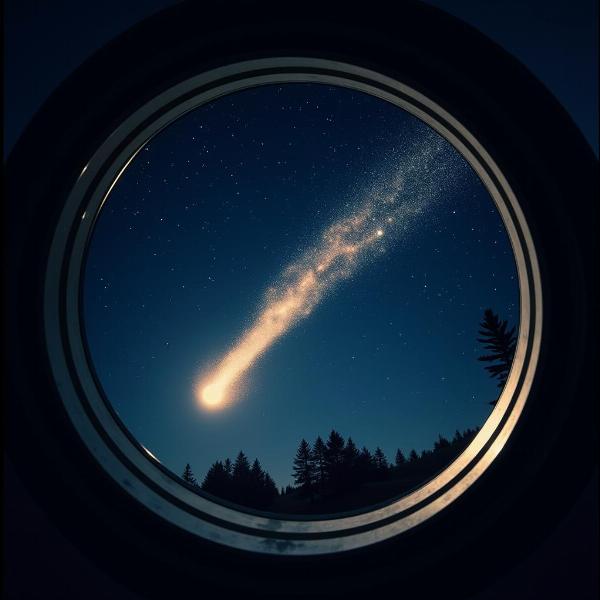Comets, those celestial wanderers with their luminous tails, have captivated humanity for millennia. Understanding the meaning of comets in Hindi provides a deeper appreciation for how these icy bodies have been perceived within Indian culture and astronomy. But what exactly is the meaning of comets in hindi? This article explores the various terms, interpretations, and cultural significance surrounding comets in the Hindi language.
Unraveling the Hindi Terminology for Comets
Several Hindi words are used to describe comets, each carrying subtle nuances of meaning. The most common term is dhumketu (धूमकेतु), which literally translates to “smoke banner” or “smoky flag.” This vividly captures the visual appearance of a comet’s tail, a characteristic feature that distinguishes it from other celestial objects. Another term used is puccha tara (पुच्छ तारा), meaning “tailed star.” This emphasizes the comet’s star-like appearance while highlighting its unique tail. Less commonly, the term nabhchar (नभचर) may be used, a more generic word referring to any celestial body moving across the sky.
Comets in Indian Mythology and Folklore
In Indian mythology, comets are often viewed as omens, sometimes portending good fortune, and other times signaling impending doom. Ancient texts like the Bhagavata Purana and the Mahabharata contain references to comets, associating them with significant events and prophecies. In some stories, comets are depicted as celestial messengers, carrying divine pronouncements. In others, they are linked to natural disasters or political upheaval. This duality in interpretation reflects the awe and apprehension that comets inspired in ancient observers.
The Scientific Understanding of Comets in Hindi
While traditional beliefs continue to hold sway, modern science has provided a clearer understanding of comets. The Hindi word for astronomy is khagol vigyan (खगोल विज्ञान), and within this field, comets are recognized as icy bodies originating from the outer reaches of our solar system. planetarium meaning in hindi can help visualize their journey. As they approach the Sun, the heat causes the ice to vaporize, creating the characteristic tail that gives them their name in Hindi – dhumketu.
Comets vs. Meteors: A Clarification in Hindi
Often, comets are confused with meteors, also known as shooting stars. While both are celestial phenomena, they are distinct. A meteor, called ulkapat (उल्कापात) in Hindi, is the streak of light produced when a meteoroid enters the Earth’s atmosphere and burns up. A comet, on the other hand, is a much larger icy body orbiting the Sun. meteor meaning in hindi and shooting star meaning in hindi provide further details on these differences.
How do you say “comet’s tail” in Hindi?
The Hindi term for “comet’s tail” is puccha (पुच्छ). This word captures the visual image of the long, flowing trail that follows a comet as it travels through space. Understanding this specific terminology is crucial for accurately describing cometary features in Hindi.
What is the cultural significance of comets in India?
Comets have held a significant place in Indian culture for centuries. They have been interpreted as both auspicious and inauspicious omens, often associated with prophecies and significant historical events. The rich mythology surrounding comets demonstrates their profound impact on the collective imagination.
Are there any famous comets mentioned in Hindi literature?
While specific comets aren’t always named in ancient Hindi texts, their appearances are often documented and linked to major occurrences. The Mahabharata, for example, mentions a comet appearing before the Kurukshetra war, interpreted by some as a foreshadowing of the conflict.
 Comet Viewed Through a Telescope in Hindi
Comet Viewed Through a Telescope in Hindi
Conclusion
The meaning of comets in Hindi encompasses both scientific understanding and rich cultural interpretations. From the vivid imagery of dhumketu to the ominous associations in mythology, comets continue to fascinate and inspire. Understanding these various dimensions offers a deeper appreciation of these celestial wanderers and their place within Indian culture and nabhchar meaning in hindi.
FAQs
-
What does the word dhumketu literally mean? Dhumketu literally translates to “smoke banner” or “smoky flag.”
-
Are comets considered lucky or unlucky in Indian culture? Comets have been interpreted as both auspicious and inauspicious omens in Indian culture.
-
What is the difference between a comet and a meteor in Hindi? A comet (dhumketu) is a large icy body orbiting the Sun, while a meteor (ulkapat) is the streak of light from a meteoroid burning up in Earth’s atmosphere.
-
How is a comet’s tail referred to in Hindi? The tail of a comet is called puccha in Hindi.
-
Where can I learn more about the scientific explanation of comets in Hindi? Resources on khagol vigyan (astronomy) can provide detailed information on comets.
Meaning-Hindi.in offers professional translation services specializing in various domains, including business, legal, technical, website localization, educational, and specialized content. Our expertise covers Hindi and a wide range of other languages. We pride ourselves on delivering accurate and culturally sensitive translations to bridge communication gaps. Contact us today for all your translation needs at [email protected] or call us at +91 11-4502-7584. Meaning-Hindi.in is your trusted partner for high-quality language solutions.